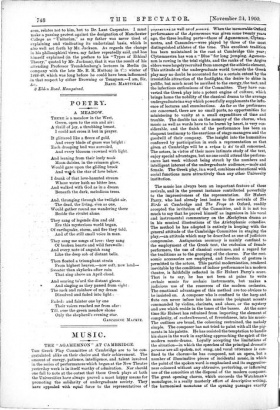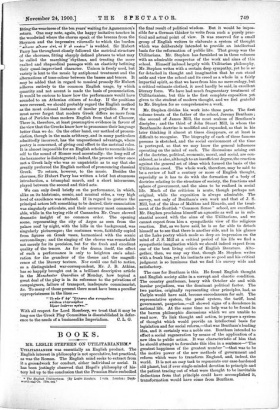MUS IC.
THE "AGAMEMNON" AT CAMBRIDGE.
THE Greek• Play Committee at Cambridge are to be con- ,Yratulated alike on their choice and their achievement. The amount of energy, patience, intelligence, and talent involved in the series of performances which began at the New Theatre yesterday week is in itself worthy of admiration. Nor should one fail to note at the outset that these Greek plays at both the Universities have always proved a most happy means for promoting the solidarity of undergraduate society. They have appealed with equal force to the representatives of yid/Apar:0a) as well as of #46/101X/j. When the -memorable Oxford performance of the Agamemnon was given some twenty years
ago, the three leading pails—those of Agamemnon,.Clytiem. nestra, and Cassandra—were played by three of the most distinguished athletes of the time. This excellent tradition has been maintained in the cast at Cambridge this year; Clyttemnestra has won a 'Blue "for long jumping, Agamem- non is rowing in the trial eights, and the ranks of the Argive elders were largely' recruited from amongst the athletic element. This attitude of the undergraduate world towards the Greek play may no doubt be accounted for to a certain extent by the irresistible attraction of the footlights, the desire to shine in public, but much must be ascribed to the energy, the tact, and the infectious enthusiasm of the Committee. They have con- verted the Greek play into a potent engine of culture, which brings home the nobility of the classical drama to the average undergraduate in a way which powerfully supplements the influ- ence of lectures and examinations. As far as the performers are concerned, there are no small parts, no opportunities for ministering to vanity at a small expenditure of time and trouble. The double tax on the memory of the chorus,- when music as well as words have to be learnt by heart, is very con- siderable, and the finish of the performance has been an eloquent testimony to the exertions of stage-managers and the goodwill of their company. The insight into the humanities conferred by participation in such a representation as that given at Cambridge will be a sti),acs ic sifi to all concerned. The actors, in virtue of their more intimate study of the text, enjoy special advantages, but no one could attend the perform- ances last week without being struck by the numbers and intelligent interest of the undergraduate audience,—male and female. The Greek play, in a word, combines educational with social functions more attractively than any other University institution.
The music has always been an important feature of these revivals, and in the present instance contributed powerfully to the impressiveness of the representation. Sir Hubert Parry, who had already lent lustre to the revivals of The Birds at Cambridge and The Frogs at Oxford, readily accepted the invitation of the Committee, and it is not too much to say that he proved himself as ingenious in his vocal and instrumental commentary on the 2Eschylean drama as in his musical illustrations of the Aristophanic comedies. The method he has adopted is entirely in keeping with the general attitude of the Cambridge Committee in staging the play,—an attitude which may be described as one of judicious compromise. Antiquarian accuracy is mainly confined to the employment of the Greek text, the exclusion of female performers, the use of classical costumes, and a regard for the traditions as to the grouping of the chorus. For the rest, scenic accessories are employed, and freedom of gesture is permitted to the actors. This partial modernisation, rendered inevitable by the conditions of indoor performance in a modern theatre, is faithfully reflected in Sir Hubert Parry's score. That is to say, he has not been at pains to write archaic music for archaic instruments, but makes a judicious use of the resources of the modern orchestra. The emotional advantages of this method are too obvious to be insisted on. A composer who is confined to the harp and flute can never infuse into his music the poignant accents commanded by violins, clarinets, and oboes, or the mystery and awe which reside in the tones of the basses. At the same time Sir Hubert has refrained from importing the element of complexity, of encheatrement, of feverishness, into his music. The outlines are broad, the colouring restrained, the melody simple. The composer has not tried to paint with all the pig- ments in his palette. He has resisted the temptation to handle his share in the work in anything approaching the spirit of the modern music-drama. Loyally accepting the limitations of the situation—in which the speeches of the principal dramatis persona are all spoken, not sung, and vocal utterance is con- fined to the chorus—he has composed, not an opera, but a number of illuminative pieces of incidental music, in which the point of the spoken word is emphasised and its suggestive- ness coloured without any obtrusive, perturbing, or inflaming use of the sonorities at the disposal of the modern composer. The great opening chorus, which succeeds the Watchman's monologue, is a really masterly effort of descriptive writing, the harmonised monotone of the opening passages exactly
fitting the weariness of the ten years' waiting for Agamemnon's return. One may note, again, the happy imitative touches in • the woodwind where the chorus speak of the breezes from the Strymon and the impressive ritornello to which the burden • " izframor stharor elri, TO 3' 110lit761" is wedded. Sir Hubert Parry has throughout closely followed the metrical structure of the choruses, fitting sharply defined phrases to what may be called the marchineihythms, and treating the more exalted and rhapsodical passages with an elasticity befitting their quasi-improvised character. Unison is freely used, but variety is lent to the music by antiphonal treatment and the alternations Of tone-colour between the basses and tenors. It may be added that in regard to musical prosody Sir Hubert adheres entirely to the common English usage, by which quantity and not accent is made the basis of pronunciation. It would be curious to know how the performance would have sounded to an Athenian citizen of to-day. If the positions were reversed, we should probably regard the English method as the most colossal instance of insular prejudice. For we must never forget that modern Greek differs no more from that of Pericles than modern English from that of Chaucer. There is, therefore, at least presumptive evidence in favour of the view that the Greeks know how to pronounce their language better than we do. On the other hand, our method of pronun- ciation, though in the main arbitrary, and in many particulars
• admittedly incorrect, has the unquestioned advantage, where poetry is concerned, of giving oral effect to the metrical rules. It is almost impossible for an English scholar to reconcile him- self to the sound of Homer read accentually: the long roll of the hexameter is disintegrated; indeed, the present writer once met a Greek lady who was so unpatriotic as to say that she greatly preferred the English method of pronouncing classical Greek. To return, however, to the music. Besides the choruses, Sir Hubert Parry has written a brief but strenuous introduction, a triumphal march, and a short intermezzo, played between the second and third acts.
We can only dwell briefly on the performance, in which, alike on its histrionic, scenic, and musical sides, a very high level of excellence was attained. If in regard to gesture the principal actors left something to be desired, their enunciation was singularly articulate, and their accuracy most commend- able, while in.the trying role of Cassandra Mr. Crace .showed dramatic insight of no common order. The opening scene, representing the city of Argos as seen from the palace roof by night, with the hills in the background, was singularly picturesque; the costumes worn, faithfully copied from figures on Greek vases, harmonised with- the scenic surroundings; and the singing of the chorus was remarkable not merely for its precision, but for the fresh and excellent quality of the tenors. As for . the drama itself, the effect of such a performance is only to heighten one's admi- ration for the grandeur of the theme and the magnifi- cence of the literary texture. Nor could one fail to notice,• as a distinguished war-correspondent, Mr. J. B. Atkins, • has so happily brought out in a brilliant descriptive article in the Manchester Guardian of Monday, how topical a great deal of the play is in its reference to the privations of campaigners, failure of transport, inadequate commissariat, &c. To many of those present there must have been a peculiar appropriateness in the lines :— " Tb war r atr VAX:wog afar furopiarois Tirbeta Txpouctpkos
&Saw ittiorrot,
With all respect for Lord Rosebery, we trust that it may be long ere the Greek Play Committee is disestablished in defer-
ence to the needs of a businesslike Imperialism. C. L. G.











































 Previous page
Previous page